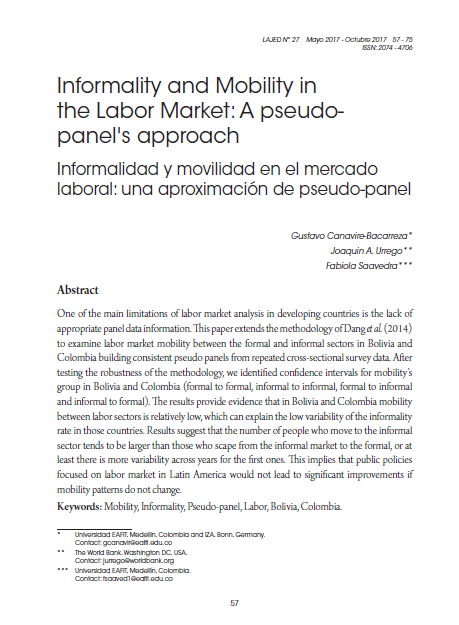Informality and Mobility in the Labor Market: A pseudopanel's approach
DOI:
https://doi.org/10.35319/lajed.20162752Keywords:
Mobility, Informality, Pseudo-panel, Labor, Bolivia, ColombiaAbstract
One of the main limitations of labor market analysis in developing countries is the lack of appropriate panel data information. This paper extends the methodology of Dang et al. (2014) to examine labor market mobility between the formal and informal sectors in Bolivia and Colombia building consistent pseudo panels from repeated cross-sectional survey data. After testing the robustness of the methodology, we identified confidence intervals for mobility’s group in Bolivia and Colombia (formal to formal, informal to informal, formal to informal and informal to formal). The results provide evidence that in Bolivia and Colombia mobility between labor sectors is relatively low, which can explain the low variability of the informality rate in those countries. Results suggest that the number of people who move to the informal sector tends to be larger than those who scape from the informal market to the formal, or at least there is more variability across years for the first ones. This implies that public policies focused on labor market in Latin America would not lead to significant improvements if mobility patterns do not change.
Downloads
References
Bosch, M., E. Goni and W. Maloney. 2007. “The determinants of rising informality in Brazil: Evidence of gross worker ows”. Technical Report 2970, Institute for the Study of Labor (IZA).
Bosch, M. and W. F. Maloney. 2010. “Comparative analysis of labor market dynamics using markov processes: An application to informality”. Labour Economics, 17(4):621 - 631.
Bourguignon, F. 1979. “Pobreza y dualismo en el sector urbano de las economías en desarrollo: El caso de Colombia”. Desarrollo y Sociedad, 1:39-72.
Cruces, G., G. Fields and M. Viollaz. 2013. “Can the limitations of panel datasets be overcome by using pseudo-panels to estimate income mobility?” Technical report, Institute for the Study of Labor (IZA).
Dang, H.A., P. Lanjouw, J. Luoto and D. McKenzie. 2014. “Using repeated cross-sections to explore movements into and out of poverty”. Journal of Development Economics, 107:112 - 128.
Evia, J. L. and N. Pacheco. 2010. “Una perspectiva económica sobre la informalidad en Bolivia”. Technical report, The Konrad-Adenauer-Stiftung (KAS).
Gagnon, J. 2009. “Moving out of bad: jobs more mobility, more opportunity”. In: Jutting, J. and de LaiglesiaJan, J., (editors), Is informal normal? Towards more and better jobs in developing countries, 115-142. The Organization for Economic Co-operation and Development (OECD).
Galvis, L. A. 2012. “Informalidad laboral en las áreas urbanas de Colombia”. Technical Report 164, Documentos de trabajo sobre economía regional, Banco de la Republica.
Gómez, J. C. and D. Morán. 2012. “Informalidad y tributación en América Latina: explorando los nexos para mejorar la equidad”. Technical Report 124, Serie Macroeconomía del Desarrollo.
Maloney, W. F. 2004. “Informality revisited”. World Development, 32(7):1159 -1178.
Meghir, C. & L. Pistaferri. 2011. “Earnings, consumption and life cycle choices”. Handbook of Labor Economics, 4, 773-854.
Rauch, J. E. 1991. “Modelling the informal sector formally”. Journal of Development Economics, 35(1):33 - 47. 75 Gustavo Canavire-Bacarreza, Joaquin A. Urrego y Fabiola Saavedra
Schneider, F. 2004. “The size of the shadow economies of 145 countries all over the world: First results over the period 1999 to 2003”. Technical Report 1431, Institute for the Study of Labor (IZA).
---------- 2007. “The shadow economies in middle and south America and their influence on the oficial economy: what do we know?”. Technical Report, Johannes Kepler University.
Slonimczyk, F. and V. Gimpelson. 2015. “Informality and mobility”. Economics of Transition, 23(2):299-341.
Uribe, J. I., C. H. Ortiz and G. A. García. 2007. “La segmentación del mercado laboral colombiano en la década de los noventa”. Economía Institucional, 9(16):189-221.
Villarroel, P., W. Hernani-Limarino and A. Eid. 2011. “Entrepreneurship and economic mobility: A case study of Bolivia”. Working Paper, Fundación ARU






